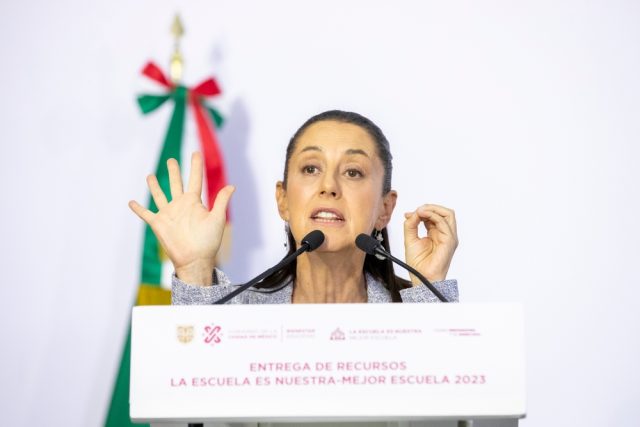
Claudia Sheinbaum Pardo became Mexico’s first female president. The former head of the regional government of Mexico City, Sheinbaum—from the MORENA party—is the political heir to Andrés Manuel López Obrador (AMLO), the current president of Mexico.
Sheinbaum obtained almost 60% of the vote against her main competitor, Xóchitl Gálvez who received some 30% of the vote.
A physicist, Sheinbaum will also become Mexico’s first Jewish president, a significant milestone, considering the country has one of the largest Catholic populations in the world.
Mexico’s president elect has said she will govern “with the same principle’s as AMLO.”
“This is good for Mexicans,” she added.
Sheinbaum victory is not minor, considering she received five more million votes that AMLO got in his election in 2018.
According to a report by Foro Madrid—an initiative of Fundación Disenso, the think tank of the Spanish VOX Party (ECR)—López Obrador has attempted to perpetuate himself of power with electoral reforms. The Mexican people rejected that attempt with massive protests against these measures.
The law left him with no option but to appoint a heir to continue his legacy
Foro Madrid report indicates that, with AMLO, “Mexico has become an example for the left in Hispanic America.”
It also says that Claudia Sheinbaum “represents the continuity of AMLO’s political agenda.”
It is unclear whether AMLO will have a role or influence in Sheinbaum’s new government, which has attempted to set itself apart to the leaving administration.
Mexico’s foreign policy, then, is expected to continue, which means a continuing detriment to democratic norms in the region.
AMLO and his MORENA party are part of the Puebla Group (Grupo de Puebla), a far-left organization that sets political priorities for countries in the Latin American region. This organization, together with the Sao Paolo Forum, provides legitimacy to regimes with eroding democratic regimes and full dictatorships, like Nicolás Maduro’s Venezuela, Daniel Ortega’s Nicaragua, and communist Cuba.
Sheinbaum herself has boasted she spoke with Miguel Díaz Canel, the current president of Cuba, who perpetuates the Castros’ communist policies and has a history of brutally repressing his people during manifestations against the regime.
Mexico—one of the largest economies of Latin America—has used its power and influence during the AMLO presidency to push for larger Latin American integration but at the expense with the continent’s relationship with the United States.
With the use of international organisations like CELAC, whose Heads of State attended a summit in Brussels last year with their European counterparts, Mexico has pushed for a regional agenda that excludes so-called “imperialist” countries apart.
Moreover, the MORENA policies have not served to remediate the country’s grave security situation.
The International Crisis Group indicates that the number of criminal gangs in Mexico that are linked to drug cartels, and illegal armed groups has grown considerably over the last decade.
AMLO has governed Mexico for six of those ten years.
Between 2022 and 2023, there was a spike in the number of murders against journalists.
As Foro Madrid reports, “Mexico is the most dangerous country for journalists.” The free press has become a target for criminal organisations.
While journalists live a dire situation, the national government constantly criticises dissenting media.
Although recent victories of freedom-loving candidates in Paraguay, Argentina, and Ecuador have started to push back the so-called “pink wave” of new Socialist movements, Mexico’s re-do of the current government represents a step back in the fight for democracy, freedom, and the rule of Law in the Americas.
Latin America is currently in the midst of an electoral “super cycle” with six countries going to the polls this year. Mexico’s general election was preceded by electoral contests in El Salvador, Panama, and the Dominican Republic. Venezuela and Uruguay will follow, albeit there are no democratic safeguards or guarantees for the results in Venezuela to be considered valid.



 Subscribe
Subscribe